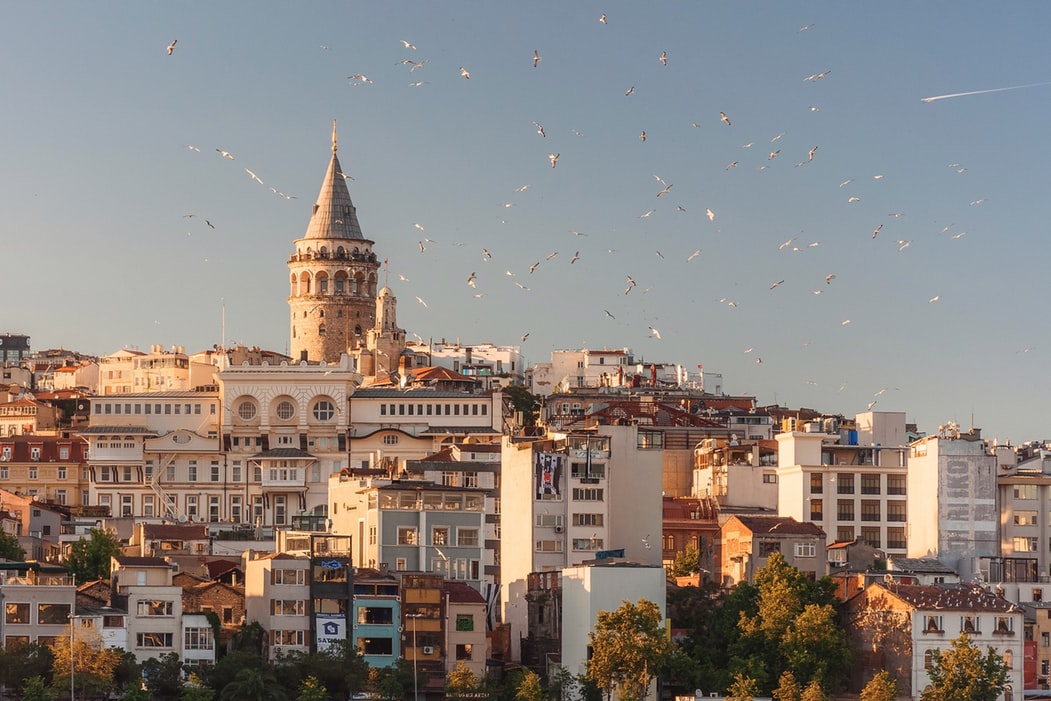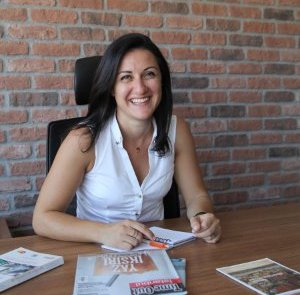Istanbul is a true melting pot of different cultures and lifestyles. The cliché about Istanbul is that it is where ‘East meets West’ and it is true in many perspectives. This is where Europe is connected to Asia with three suspension bridges, but also where moderate Islamic culture meets European culture as well. Istanbul is a great representation of Turkey in many ways, people from all over the country have migrated here since the 50s in order to find jobs and have a better life. Some did and some did not.. This is where you find the most liberal and most conservative people in the country.
Turkey has close to 80 million inhabitants and Istanbul houses close to 18 million of them. Istanbul is the biggest city in the country and the social, cultural and economic capital of the country, though the political capital has been Ankara since 1923 when the modern Turkish republic has been founded. (Turkey is a secular country, run with parliamentary democracy since 1923). Istanbul has many film festivals (international film festival, independent film festivals, women’s film festivals and more), music festivals (international music festival –classical-, international jazz festival and other jazz festivals sponsored by big Turkish banks).
Istanbul is famous with the Bosphorus strait, the only strait in the world that divides two continents: Europe & Asia. The Bosphorus, and the Golden Horn (big bay that created a natural harbor both for Byzantines & Ottomans) make Istanbul quite special both geographically and strategically. Sunrise over the Bosphorus and sunset over the Golden Horn are some of the most beautiful ones you would be able to see in the world.
Istanbul has been the capital city for four empires for almost 16 centuries: Roman, Byzantine (Eastern Roman), Latin (Fourth Crusaders era) and Ottoman. Constantine the Great declared Istanbul as the new capital of the Roman Empire on May 11th, 330 AD and named her ‘Nova Roma’ (new Rome). When the empire split into two as ‘West Roman Empire’ and ‘East Roman Empire’, Istanbul (called Constantinople upon the death of the famous Roman emperor ‘Constantine the Great’) became the capital of the East Roman Empire, which we call ‘Byzantine’ today. The city became the capital of the Fourth Crusaders for only 57 years and finally, became the capital of the Ottomans in 1453 when Mehmet the Conqueror (‘Fatih’ in Turkish) captured the city. Istanbul was Ottoman Empire’s third and last capital from 1453 till the empire fell with the WWI. In 1923, modern Turkish republic was founded and the capital was moved to Ankara where it still is. This is the reason why many European countries have beautiful consulate buildings in Istanbul since many of them have housed the embassies of those countries/empires for centuries.
Istanbul is a city that never sleeps. Here you can start your day with the famous and healthy Turkish breakfast (rich with cheese –especially ‘white cheese’ known as ‘feta’ by the western world), followed by world famous Turkish coffee, wander among interesting exhibitions, enjoy delicious lunch (which can be anything from famous kebabs, ‘meze’s (olive oil dishes served in small portions like ‘tapa’s to contemporary Turkish cuisine), watch the sun go over some of the most beautiful UNESCO world heritage sites, enjoy a contemporary Turkish dinner and party till 4am.
Climate
Istanbul enjoys four distinct weather seasons. Winter brings very cool temperatures and snowfall, while summers in the city are very hot and humid, sometimes topping 35 °C, with serious humidity in August. August is perhaps the only month to avoid though all offices have A/C’s. It is just difficult for sightseeing, though sites like Hagia Sophia and Underground Cistern have natural A/C with the stones they were built with. The best times to visit the city are in April through November (except August). Best months are May, September and October. Temperatures would be around 15-25 degrees Celsius during these months.
Local business etiquette and customs
In Turkey, social encounters between men and women who are not relatives or close friends are conducted on a more formal level than in Europe. Be pleasant, but don’t smile readily at men you don’t know, in both business and social contexts (at restaurants/bars, or when ordering a taxi, registering at a hotel). In Turkey, it is customary for women to act more reserved until they know a man well. Hand shake is used when you meet someone for the first time.
Also bear in mind that Turkish men can be very forward with foreign women, in part motivated by the media image of the ‘loose‘ western woman. Think carefully before accepting any invitations and avoid being alone with a man or group of men you do not know well. That said, Turkish people in general are extremely welcoming and helpful to foreigners. As long as you take normal, common-sense precautions, it is very unlikely that you will be hassled in any way.
What to wear: In Istanbul, woman’s clothing standards are relaxed, modern and European. However, to prevent unwanted attention, you should cover your cleavage and perhaps avoid mini skirts in some parts of the city. You are not required to wear the hijab in Istanbul; indeed, many Turkish women do not wear it. But I would recommend that you carry a scarf that can double as headscarf in case you want to enter a mosque, where all women are required to cover their hair.
Travel and transport
Istanbul’s transport system is comprehensive and varied. The tram, metro and metro bus network covers much of the city and allows residents to bypass the infamous Istanbul traffic. The bus system is regular and reliable, and the ferries that link the European and Asian sides leave approximately every 20 minutes. It is safe for women to use the public transport network alone at all hours.
Upon arrival in Istanbul, the most commonly used and convenient transport option is to take a taxi to your hotel. Outside the arrivals terminal is the official taxi rank. A ride to Sultanahmet should cost around 50TL, while the ride to Taksim will cost around 65TL. If you plan to take a taxi, make sure you write down the exact address of your hotel on a piece of paper, along with its phone number. If you have time, I would also recommend pinpointing its location on a city map. Istanbul is a large city with many hotels and not even taxi drivers know it by heart; it helps to give them as much information as possible.
When choosing a taxi, make sure that it has a meter to record the exact cost of the journey; this will avoid the driver charging over the odds for a journey. Also make sure you have small bills to pay for the journey; a selection of 10TL, 20TL and 50TL notes is perfect (you can withdraw Turkish Liras from the cash points in the airport upon arrival). Be weary of 50 TL which is similar to 5 TL and rarely taxi drivers would tell you that you paid them 5 TL when you have paid them 50 TL.
Official taxis are bright yellow in colorr; do not accept rides from any other cars claiming to be taxis. You can also use Uber in Istanbul. It would be a good way to get to your hotel and you do not need to use cash.
The Havataş is the municipality owned and reliable airport shuttle service. It leaves from outside the Ataturk airport arrivals terminal, in the second lane every half hour. The bus destination is Taksim. It stops in front of the Point Hotel, just past Taksim square. The ride costs 10TL and takes around 40 minutes depending on traffic. If your destination is Sultanahmet, you are better off taking a taxi, Uber or a private transfer (which can be arranged by istanbulite).
Dining
Karaköy:
Karaköy Lokantası
Ali Ocakbaşı Karaköy
Neolokal
Mana
Colonie
Mangerie
Asmalımescit:
Asmalı Cavit
Ece Aksoy
Yeni Lokanta
Yare Meyhane
Mikla
Gram
Miss Pizza
Duble Meze
Nişantaşı:
Alancha
Hünkar
Başköşe Kebap
Delicatessen
Bebek:
Lucca
Mangerie
Bebek Balıkçısı
Cup of Joy
Happily Ever After
Arnavutköy:
Vira Vira
Adem Baba
Alexandra’s Cocktail Bar
Edirnekapı:
Asitane Restaurant
Levent:
Develi Kebap
Cihangir & Çukurcuma:
Demeti Meyhane
Geyik Coffee & Roasting
Journey Café
Petra Roasting Co
Cuma Café
Zorlu Shopping Mall:
Cantinery
Women’s network and events
Networks
PWN Global is a dynamic fast-growing offline and online networking and leadership development platform for professional women of all sectors and industries. With over 3,500 members and more than 90 nationalities, our volunteer-led organisation delivers over 600 events a year in our community of 25 city networks. We welcome you to our events; as a mentor or mentee; to explore our rich knowledge and resources; to learn, grow and leave your legacy, whilst volunteering across the Federation and our City Networks. Find out more about our city networks, here ; join our mission, here ; or, sign up for our monthly event mailer and quarterly newsletter, here. If you want to find out more from a ‘live’ person, don’t hesitate to contact Rebecca Fountain, PWN Global’s Head of Global Marketing and Communication.

